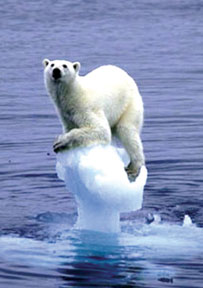|
Father of climate change:
2C limit is not enough
 Talks to limit global temperature rises to 2C will not prevent the
possibility of dangerous climate change, warns the scientist who first
raised the alarm over global warming. James Hansen, director of Nasa's
Goddard Institute for Space Studies in New York, said there was a
widespread misconception among international climate negotiators meeting
in Durban, South Africa, that the 2C "safe" target would stop extreme
changes. He believes carbon dioxide concentrations - now at nearly 389
parts per million (ppm) - should be no higher than 350ppm to stop
catastrophic events such as the melting of ice sheets, dramatic sea
level rises and methane being released from beneath the permafrost. Dr
Hansen, the "father of global warming", first raised the issue at US
Senate hearings in 1988. Talks to limit global temperature rises to 2C will not prevent the
possibility of dangerous climate change, warns the scientist who first
raised the alarm over global warming. James Hansen, director of Nasa's
Goddard Institute for Space Studies in New York, said there was a
widespread misconception among international climate negotiators meeting
in Durban, South Africa, that the 2C "safe" target would stop extreme
changes. He believes carbon dioxide concentrations - now at nearly 389
parts per million (ppm) - should be no higher than 350ppm to stop
catastrophic events such as the melting of ice sheets, dramatic sea
level rises and methane being released from beneath the permafrost. Dr
Hansen, the "father of global warming", first raised the issue at US
Senate hearings in 1988.
He has advocated drastic curbs on carbon dioxide emissions by
limiting fossil fuel burning. The Durban talks are based on the idea
that carbon dioxide concentrations should aim to keep global average
temperatures to the 2C target. Dr Hansen said that target was still too
high to forestall wholesale global changes.
"The target of 2C... is a prescription for long-term disaster," he
said. "You can't say exactly what long term is but we are beginning to
see signs of slow [climate] feedbacks beginning to come into play.
"Ice sheets are beginning to lose mass and methane hydrates are to
some degree beginning to bubble out of melting permafrost.
"We should be aiming to keep CO2 no higher than about 350ppm and
possibly somewhat less. That is probably necessary if we want to
maintain stable ice sheets and shorelines and avoid many other issues."
Some scientists believe 450ppm is a reasonable target for carbon
dioxide concentrations while others expect a more realistic 550ppm,
about twice pre-industrial levels.
Dr Hansen told the American Geophysical Union in San Francisco that
at those levels, dramatic changes to our world were inevitable. "If we
want to maintain a planet that looks like the one humanity has known,
then we're basically out of time," he said.
"We have got to start reducing emissions, but this continued rapid
growth [in emissions] makes it exceedingly difficult."
- Independent
|

